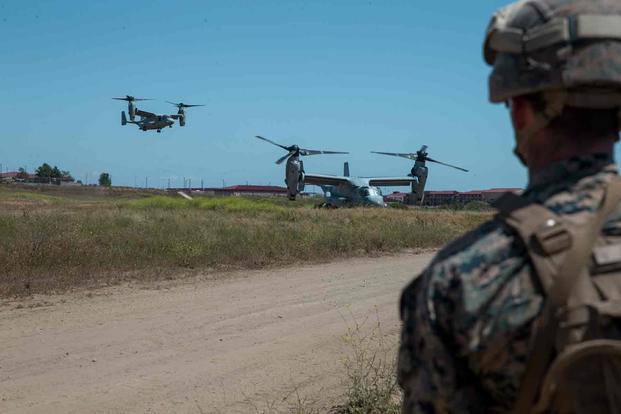Nearly four years after a civilian skydiving aircraft collided with a Marine Corps MV-22 Osprey sitting on a San Diego runway, the U.S. government has settled the civil case after suing the businesses involved for damages -- as well as the pilot, the airport and the city.
The U.S. government had sought upward of $5.7 million in damages, according to the original lawsuit. But officials and defendants "stipulated to dismiss the case with prejudice, after entering a global settlement agreement in which the United States recovered $2,020,000," less than half of what was originally sought, according to a press release from the U.S. Attorney's Office for the Southern District of California.
"This unfortunate incident caused an MV-22 to be stricken from service, which resulted in a significant loss to the United States and the Department of the Navy," U.S. Attorney Tara McGrath said in the release. "Securing an early resolution in this case achieved the right result."
Defendants who reached a settlement include Christopher Sanders, the pilot of the skydiving aircraft; Tac Air Ops LLC; Tac Air California Inc.; Kapowsin Air Sports Ltd.; Lancair Corp.; Brown Field Aviation Ventures Inc.; Brown Field Municipal Airport; and the city of San Diego, according to the press release.
Kelly Thornton, a spokeswoman for the U.S. attorney's office, did not respond to an email or several phone calls seeking comment prior to publication about the resolution of the case and clarification regarding the parties named in the lawsuit. Thornton also declined to provide additional comment following Military.com's report last year.
"We are glad this is behind us, and we're happy to get back to our top-notch training for our special operations forces," a representative from Tac Air Ops LLC told Military.com on Wednesday.
The incident happened between May 29, 2020, and May 31, 2020, according to the original lawsuit, when Marine Medium Tiltrotor Squadron 163 ordered two MV-22 aircraft to fly from Marine Corps Air Station Miramar, California, to Brown Field, about 30 miles away, to conduct routine training flights.
On May 29, a VMM-163 Osprey aircraft with the call sign "Evil Eye 11" landed at the airport just before midnight and began heading to its usual parking spot, which wasn't available. It ultimately settled in another spot next to several other aircraft, including a de Havilland DHC-6-100 Twin Otter aircraft.
According to the lawsuit, Sanders, the pilot of the Twin Otter, got in the plane the next morning, May 30, and "powered the right engine to 100% and the left engine to 50%." The plane then collided with the Osprey, it added.
"After traveling more than 80 feet and turning 95 degrees to the left, the Twin Otter impacted the MV-22," the lawsuit states. "The damage to the MV-22 included, but was not limited to, the left proprotor, the left nacelle and engine, the nose wheel, the wing, and the right proprotor blade of the MV-22."
No injuries were reported from the incident, according to a Naval Safety Command report. The news of the original civil lawsuit was first reported last year by Seamus Hughes of Court Watch.
The Osprey is praised among the Marine Corps, Navy and Air Force for its unique ability as a tiltrotor aircraft to fly long distances at higher speeds than helicopters and still land in relatively tight locations. The airframe has been seen as crucial for its flexibility for a wide variety of missions, such as moving troops or cargo while being able to be refueled mid-flight.
However, a spate of recent casualties and deadly crashes has raised questions about the aircraft's overall safety record.
The resolution in the San Diego case comes several months after an Air Force special operations Osprey went down Nov. 29 during a training mission off Japan's Yakushima Island, killing the eight airmen aboard. The deadly crash triggered a grounding of all Air Force, Marine Corps and Navy V-22s that was lifted early last month, Military.com reported. Additionally, three Marines were killed in an MV-22 Osprey crash during training in Australia last year. Both incidents are still under investigation.
-- Konstantin Toropin contributed to this report.
Related: Feds Sue for Millions in Damages After Osprey Incident at San Diego Airport














